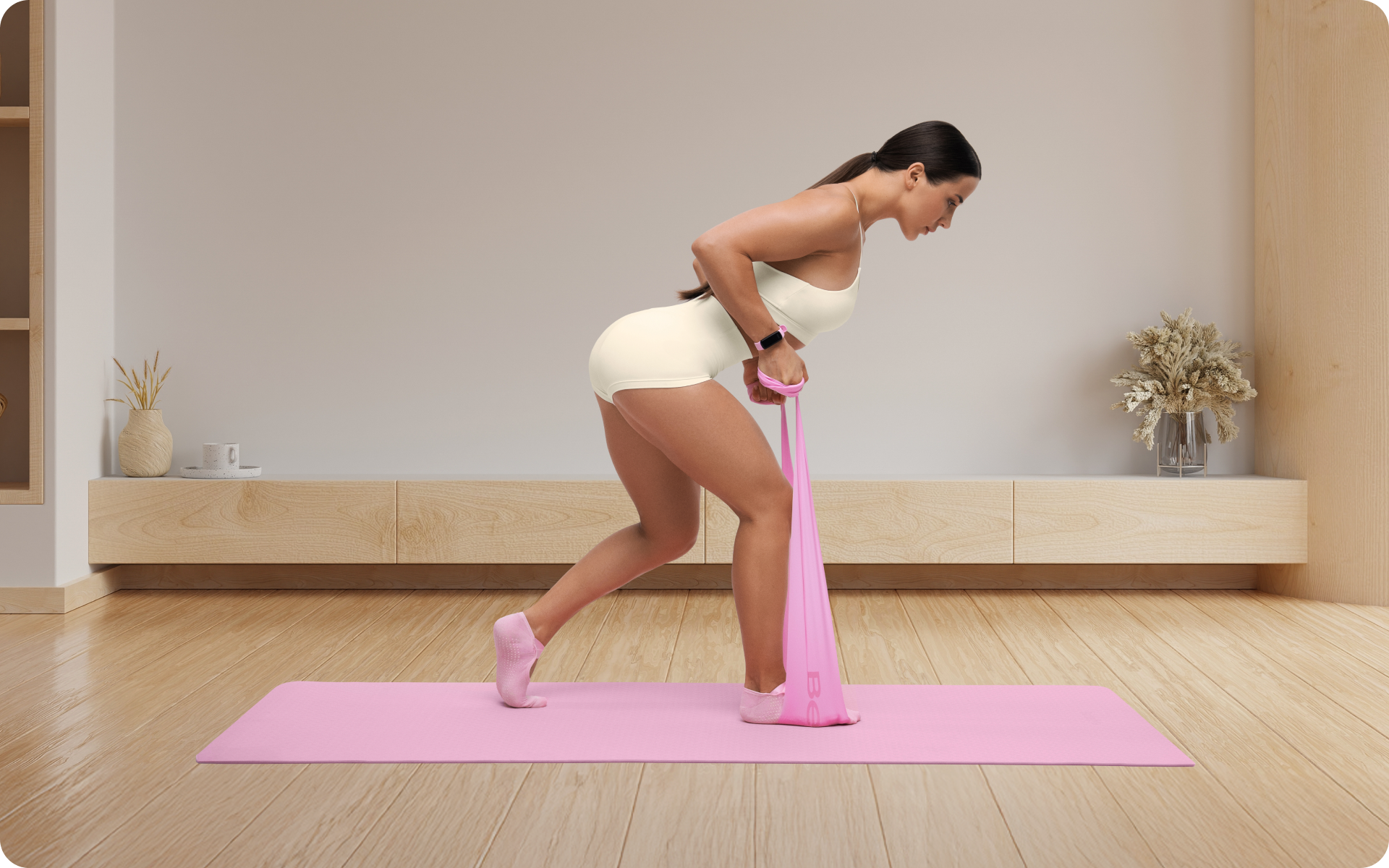Are you struggling with making working out a habit? You’re not alone. Many of us have the best intentions when it comes to getting in shape, but can’t seem to find the motivation and willpower needed to stick with a workout routine.
Get your personalized
meal plan!
Unfortunately, the physical and mental benefits of exercise are tied to a consistent routine. Frustrated by what seems like the 100th failed attempt, we ask ourselves: What’s wrong with me?
The truth is, there might not be anything wrong with you. According to research, it all comes down to habit formation (9). That’s right – understanding the science behind how habits form is key to making working out a regular part of your life.
Not to worry though, it’s simpler than it sounds. We’ve got a list of 7 crucial steps to making exercise a habit. If you’re ready to say goodbye to excuses and hello to results, here’s what you need to know:
Why, Oh Why, Can’t I Exercise Consistently?
Feeling frustrated, wondering why on earth you never seem to stick with your fitness goals? Here are some common obstacles to consistent exercise:
- You don’t enjoy it – your fav fitness influencer might make it look fun, but if you don’t enjoy the process of exercising, then you’re likely to give up quickly.
- You’re taking on too much, too soon – if you jump straight into a vigorous workout program that feels overwhelming, it’s only natural to burn out quickly and quit.
- You get bored – trudging away at the same workout routine every day, even if you enjoyed it at first, can become a chore.
- You don’t know what to do – not everybody has a knack for figuring out the most effective or efficient workout plan for their goals.
- Your life is too chaotic – while juggling work, school, and childcare, it can be hard to find time to exercise amidst the chaos.
- You’re mentally/emotionally drained – it can be hard to make yourself get up and go when you’re feeling depleted.
- It hurts, constantly – even if you enjoy the exercise process, it’s not fun to feel sore and tired all the time.
- You have an “all-or-nothing” mentality – if you feel like every workout must be perfect, and anything less than that isn’t good enough, working out becomes a guilt-ridden chore.
Read More: Don’t Have The Energy To Workout? Here’s What To Do Next
The Science Of Habit Formation And Why It Matters
The word habit is derived from the Latin word “habitus,” meaning clothes or outward appearance. This is a useful metaphor for understanding habits – they’re something that we put on, almost like a second skin.
Within psychology, habits are defined as repetitive behaviors that are triggered by environmental cues and done with minimal thought or effort (15). In other words, they’re automatic behaviors that don’t require us to invest effort into them.
So why do we keep forming habits? The answer is simple: to save energy. Every day, we’re presented with thousands of decisions, and making a decision requires mental energy.
Habits enable us to conserve this energy by allowing us to repeat the same behaviors and decision-making processes over and over again. Conserving mental energy in this way is actually an evolutionary trait.
Studies have found that the ability to form habits is what sets humans apart from other species, and it’s one of the reasons why we’ve survived for so long as a species.
Knowing this, it makes sense why forming habits is so important when it comes to exercise – if we turn our workouts into a habit, we won’t have to invest our mental energy into it. We can just get up and go!
Habit formation is a three-step loop that includes the cue, routine and reward. The cue serves as a trigger for the behavior, followed by the routine, which is the actual behavior. The reward reinforces the routine and strengthens the association between cue and behavior (8).
Some hormones play a role in habit formation as well. Dopamine, for example, is released when we complete an expected reward, reinforcing the behavior and leading to habit formation (3).
Another hormone, cortisol, is released during moments of stress or anticipation, helping to focus our attention on the task at hand (10). It can be helpful in pushing us to complete a task but too much of it can be counterproductive when it comes to forming habits.
Here’s an example of the habit loop in action:
You have a craving for chips. You get up, go to the kitchen and open the pantry. Seeing the bag of chips triggers a reward response in your brain. You eat the chips, satisfy your craving and feel a sense of pleasure and accomplishment.
The next time you get a craving for chips, the reward response is activated and you’re more likely to repeat the same action.
This can work in our favor, too. When we form healthy habits like exercising regularly, it can become easier and more automatic if we’re consistent in repeating the action. We can help establish a habit loop for working out just like we did with the chips.
We’d like to develop a loop that’s something like this; being stressed out after a long day at work (cue), so you head to the gym for a workout (routine), and afterwards, you feel energized and more relaxed (reward).
BetterMe app will kick you out of the mental funk, shake off your extra weight, rid you off your energy-zapping habits, and help you sculpt the body of your dreams. Intrigued? Hurry up and change your life for the better!
How Do I Convince Myself To Workout Everyday?
Let’s cut to the chase – to make exercising a habit, you need to do the following:
1. Dig Deep To Find A Change You Feel Strongly About
Why do you want to start working out? You probably have a long list of reasons, but to make working out a habit, you need to find the one that resonates with you the most.
Researchers have found out that having a self-determined (meaning you chose it yourself) behavioural goal that aligns with your personal values versus a goal that is externally imposed (e.g., your parents or doctor telling you to exercise) is essential for forming habits (14).
This is because when we’re motivated by something we value, we have a sense of purpose and that drives us to stick with it. We’re less likely to lose interest. Think about this – why do you want to start working out?
You’ll find that being more outgoing and being able to keep up with your kids are much more powerful motivators than trying to lose a few pounds because your health insurance provider told you to.
2. Think Of It As Developing New Behaviour Rather Than Giving Up An Old One
Focus on the positive rather than the negative. It’s easier to develop a habit if we focus on the reward instead of depriving ourselves of something.
First, because the process of breaking existing habits requires a different and much more effortful approach. Second, a reward-based mindset will be more likely to motivate us over the long run (4).
Here’s an example; rather than telling yourself, “I’ll stop driving to all my errands”, try “I’m going to park further away and walk or bike to the store.” The former implies you’re restricting yourself from something, whereas the latter is about embracing a new behavior.
3. Make It Small And Manageable
Big goals are like that shiny, new car you’ve been wanting for years – it’s tempting and looks great from a distance, but without a plan to get it, it may be hard to buy. And when you fail to reach it, disappointment and frustration will follow.
You’re more likely to stay on track if you break up your goal into smaller, more manageable steps and focus on the journey rather than the destination. An achievable goal is much more motivating than an ambitious one, especially when starting out with something new and unfamiliar (5).
Each time you accomplish a small step, you’ll gain confidence and more importantly, create an opportunity to reward yourself.
Start small and work your way up. If you’re trying to establish a habit of running three times a week, for example, start with a 30 minute walk, thrice a week. Or walking on your lunch break. When you feel comfortable with that, move up to jogging and eventually running.
4. Have A Realistic Expectation Of How Long It Will Take You To Form A Habit
Unrealistic expectations of the time it takes to form a habit will quickly break your spirit and leave you feeling like you’re wasting time. How long does it take to make exercise a habit?
There are many unproven claims out there that suggest it takes 21 days to form a habit, but the truth is that it’s different for everyone. The most reliable estimate, proven by research, is 66 days (7).
That said, there are several compounding factors such as the complexity of the behaviour and your lifestyle that can drastically affect how long it takes for something to become a habit (6).
Don’t be discouraged if it takes longer for you to form a habit. You may find that certain behaviours become a habit faster than others, so keep track of your progress and celebrate the small wins. In this case, slow but steady wins the race.
Read More: Boxing Techniques: 10 Moves Every Fighter Should Master For An Effective Workout
5. Choose A Cue
Remember that habits are triggered by an environmental or internal cue and repeating these cues will eventually make your desired behaviour a habit (13).
It could be something as simple as putting your running shoes by your bed or listening to a certain podcast every morning before you begin.
You can even create an environment that promotes the desired behaviour (11). For example, if you’re trying to become an early morning runner, put your running gear in plain view the night before and make sure your alarm is set in a spot that will force you to get out of bed to turn it off.
A cue that’s tied to your existing routine is more likely to stick, so try to link it with a behaviour you’re already doing. For example, “when I go on my lunch break, I’ll take a walk.” When it’s noon every day, you’ll be more likely to remember that it’s time for your walk.
It’s also helpful to be aware of the cues that make you want to skip a workout. Are you too tired after work or do certain people discourage you from exercising? Becoming aware of your triggers can help you stay on track.
6. Repeat
The most important step in forming any habit is repetition (4). The more you repeat your desired behaviour, the stronger it becomes and the less effort you require to do it.
A challenge many of us face is finding the motivation to repeat the behaviour. To help you stay motivated and on track, find a study buddy or an accountability partner. This will help you stay focused and committed to your goals (1).
Additionally, you can join a fitness or running group in your neighbourhood, which is a great way to add variety to your workout routine and make it more enjoyable.
But what if repeating the same routine is boring? Yeah, that can happen. One solution is to cautiously mix things up (2). We say cautiously because while varying your routine may stave off boredom, it can also make it harder to establish the habit.
For example, if you’re trying to form a habit of running three times a week, don’t suddenly switch to going to the gym three times a week. Instead, mix things up within the same realm of exercise; one day go for a run, another do an interval workout or a bodyweight workout.
Lean and toned up body isn’t just a far-fetched fantasy. Check out the BetterMe app and watch it propel your weight loss journey into high gear!
7. Reward Yourself
We all need motivation and what better way to stay motivated than by rewarding yourself? You can reward yourself with something as simple (and inexpensive) as a post-workout smoothie or Powerade to refuel your body.
But don’t forget that the biggest reward is forming a consistent workout habit. Achieving this will bring positive changes in your life and make you feel a lot better physically and mentally.
The Bottom Line
Forming a consistent workout habit is no easy task but it’s definitely worth the effort. With an understanding of how habits are formed, choosing the right cues and rewards, and consistency in your routine, you can make working out a regular part of your life.
DISCLAIMER:
This article is intended for general informational purposes only and does not serve to address individual circumstances. It is not a substitute for professional advice or help and should not be relied on for making any kind of decision-making. Any action taken as a direct or indirect result of the information in this article is entirely at your own risk and is your sole responsibility.
BetterMe, its content staff, and its medical advisors accept no responsibility for inaccuracies, errors, misstatements, inconsistencies, or omissions and specifically disclaim any liability, loss or risk, personal, professional or otherwise, which may be incurred as a consequence, directly or indirectly, of the use and/or application of any content.
You should always seek the advice of your physician or other qualified health provider with any questions you may have regarding a medical condition or your specific situation. Never disregard professional medical advice or delay seeking it because of BetterMe content. If you suspect or think you may have a medical emergency, call your doctor.
SOURCES:
- Accountability Partner Tips: How to Be an Accountability Partner (2022, masterclass.com)
- A new look at habits and the habit-goal interface (2007, pubmed.ncbi.nlm.nih.gov)
- Dopamine in motivational control: rewarding, aversive, and alerting (2011, ncbi.nlm.nih.gov)
- Exploratory study of the impact of perceived reward on habit formation (2018, biomedcentral.com)
- Goal Setting and Action Planning for Health Behavior Change (2019, ncbi.nlm.nih.gov)
- Habits, Quick and Easy: Perceived Complexity Moderates the Associations of Contextual Stability and Rewards With Behavioral Automaticity (2019, frontiersin.org)
- How are habits formed: Modelling habit formation in the real world (2009, onlinelibrary.wiley.com)
- IDC theory: habit and the habit loop (2020, springeropen.com)
- Making health habitual: the psychology of ‘habit-formation’ and general practice (2012, ncbi.nlm.nih.gov)
- Positive upshots of cortisol in everyday life (2017, ncbi.nlm.nih.gov)
- Pro-environmental habits: An underexplored research agenda in sustainability science (2021, link.springer.com)
- Promoting habit formation (2010, tandfonline.com)
- Psychology of Habit (2016, researchgate.net)
- The support of autonomy and the control of behavior (1987, pubmed.ncbi.nlm.nih.gov)
- What is a habit? Diverse mechanisms that can produce sustained behavior change (2020, sciencedirect.com)










